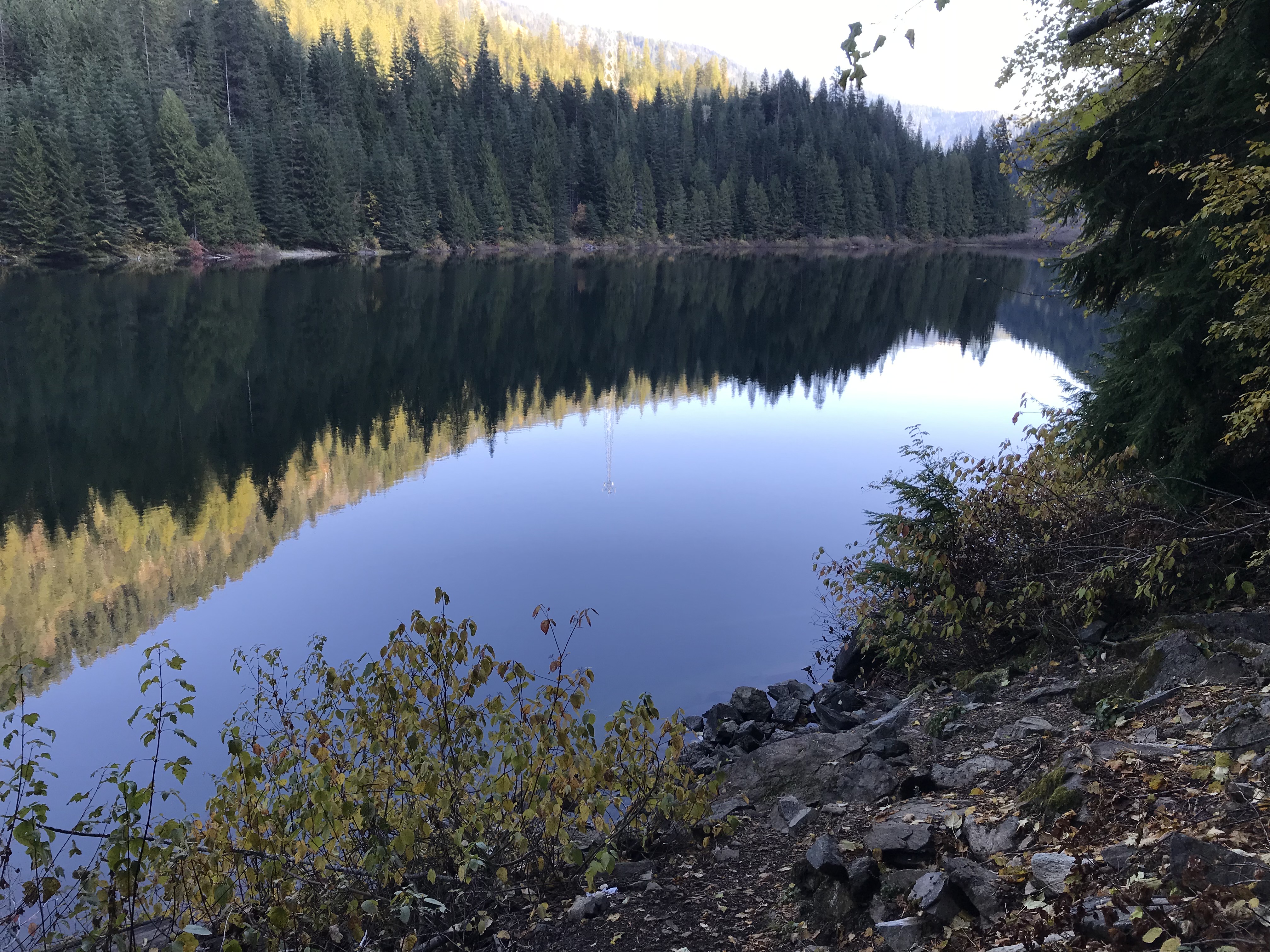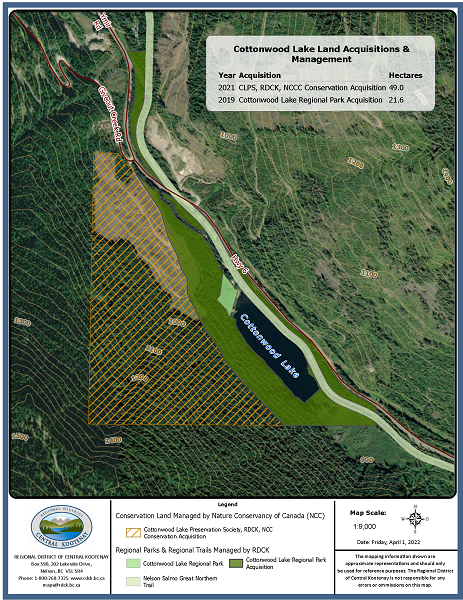Preserving Cottonwood Lake for the next generation - A community comes together for a greater cause
April 4, 2022
Located just south of the City of Nelson along Highway 6 towards Salmo in Electoral Area ‘E’ of the Regional District of Central Kootenay (RDCK) is Cottonwood Lake. Known for its picturesque setting among the Selkirk Mountains, Cottonwood Lake is a recreation destination for residents of the RDCK.
While the community has benefitted from this outdoor playground for decades, what they did not probably realize is only a small portion of the land was actually owned by the RDCK, the rest was private land. Originally, the RDCK owned 0.7 hectares which amounted to the footprint of the beach and the parking area. However, when the private land owner started logging the land, the community mobilized and provided the RDCK with the support needed to buy the land. In 2019, the RDCK purchased 21.6 hectares of land, including land around the lake and the western flank, from the private land owner for $450,000. The purchase was partially funded with a $200,000 grant from Columbia Basin Trust (the Trust).
“The majority of the public assumed the land around Cottonwood Lake was crown land and therefore would remain as is,” said Joe Chirico, RDCK Community Service Manager. “However, with the threat of logging by the private land owner, the RDCK responded to the need of the community. We identified the land was appropriate to expand our park service and made a reasonable deal.”
“Cottonwood Lake is a recreation hub for rural areas and the city of Nelson, boasting the Nelson Salmo Great Northern Trail, fishing, mountain biking, and skating in the winter,” said Ramona Faust, RDCK Electoral Area ‘E’ Director. “As well, it is crucial wildlife habitat and home to old growth trees, estimated to be 300-400 years old, so it was important for the RDCK to help preserve the land and maintain its natural setting for locals and tourists alike to enjoy.”
Despite the purchase there was still another 49 hectares of private land in the area slated for logging. Concerns from the public ranged from land stability to wildlife habitat to the conservation of the popular recreation area. In response, the Cottonwood Lake Preservation Society (CLPS) was formed with the goal of raising enough money to purchase the land.
In 2019, the society negotiated a deal with the private land owner. It took all of 2020 and 2021 for the society to reach its fundraising goal which included additional funding from Fish & Wildlife Compensation Program ($75,000), Sitka Foundation ($75,000), the Trust ($60,000), the Conservation Alliance ($54,000), FortisBC ($20,000), Nelson & District Credit Union ($10,000), Royal Bank of Canada Foundation ($10,000), Kootenay Lake Conservation Fund ($10,000), RDCK Area E ($10,000), and close to 1,000 other individual groups and local business contributors. In turn, CLPS, along with the RDCK and the Nature Conservancy of Canada (NCC) set up a memorandum of understanding that the RDCK would purchase the land on behalf of the CLPS and then donate the land to NCC.
"These efforts show the power of community members who express their voices and then partner with organizations like the RDCK to achieve their goals,” said Will Nixon, Senior Manager, Delivery of Benefits, Columbia Basin Trust. “We were glad to be able to support these purchases, which are positively impacting ecosystems and community well-being through expanding a park and protecting its surroundings into the future.”
“Without the support of the RDCK and the Trust, none of this would have been remotely possible,” said Andrew McBurney, Cottonwood Lake Preservation Society. “The community at large recognized the gravity of losing Cottonwood Lake and was hell-bent on making sure that it didn’t happen. It was heartwarming to see and feel the citizenry, young and old, come together. The entire community pitched in. There were silent auctions, music concerts, letter writing campaigns to local politicians, public pleas on CO-OP radio shows, open houses, emails and phone calls to all forms of media and it was all done with volunteer grit.”
“Full credit goes to the Cottonwood Lake Preservation Society for their commitment and hard work over the last number of years, “ said Chirico. “Following the RDCK Board’s approval of the land donation agreement to NCC at the March 2022 Board meeting the final step is to fulfill the commitment to ensure the lands are protected for conservation.”
NCC is Canada’s leading land conservation organization, having helped to protect 15 million acres coast to coast to coast. The not-for-profit land trust has been active in the RDCK since 1996, and will manage this land in perpetuity, with a focus on fire mitigation, mapping rare species and restoring ecological damage.
“This project offered a welcome opportunity to work in partnership with the Cottonwood Lake Preservation Society and the regional district to conserve the forested slopes around the Cottonwood Lake Regional Park,” said Richard Klafki, Canadian Rockies Program Director, Nature Conservancy of Canada. “Our staff will develop a long-term management plan that will be aimed at restoring and maintaining the conservation values of the land. We will also continue to collaborate with RDCK on a visitor use strategy that is in alignment with low impact recreation and safeguards the ecological values of the area.”
“At a time when we are bombarded with evidence that the natural world is crippling under the weight of what some call progress, it’s never been more critical to protect and preserve what little is left,” said McBurney. “We heard from many respected researchers and specialists on concerns for threatened grizzlies to fish, great blue herons, soil erosion, rising lake temperature, flood risks and avalanche hazards in the area. We are under no illusion that the preserved land at Cottonwood is somehow going to tip the balance in favour of Mother Nature, but it sure can help.”
The investment in Cottonwood Lake Regional Park does not stop at the purchase of the land. There is $610,000 allocated for numerous improvements over the next year to upgrade the park to be accessible to all segments of the population - $213,000 from RDCK Areas E, F, and G Community Works Funding, $200,000 from the Kootenay Adaptive Sport Association, and $197,000 from TransCanada Trail Funding. Upgrades include two new observation viewing platforms (one on each side of the lake), enhanced parking, a new washroom facility, and the majority of trails will be brought up to a universal access standard. The lake will also continue to be stocked by Freshwater Fisheries Society of BC with approximately 2,000 trout a year.
“One of the biggest draws about living or traveling in the RDCK is the outdoor recreation and we understand the importance of investing in our parks and trails, not only to maintain and improve them, but also to make them accessible for everyone to have a great park experience,” said Faust.
The RDCK’s commitment to preserving parkland goes beyond Cottonwood Lake. Over the last 10 years the organization has made a concerted effort to expand parks and trails throughout the region. Since 2012, the RDCK has added seven regional parks totaling 106.8 hectares (Balfour Beach Regional Park, Crawford Creek Regional Park, Crescent Valley Beach Regional Park, Lardeau Regional Park, McDonalds Landing Regional Park, Morning Mountain Regional Park and Waterloo Eddy Regional Park) and acquired another 97 hectares of private land (Cottonwood Lake Regional Park, Crawford Creek Regional Park, Crescent Valley Beach Regional Park, Taghum Beach Regional Park and Waterloo Eddy Regional Park). In total the RDCK operates 26 Regional Parks (www.rdck.ca/parks), which include waterfront access parks, multi-purpose parks and regional trails. For those living in the RDCK, outdoor recreation is a top priority, so if there is private land for sale that has community value, the RDCK will support a community initiative to take a serious look at the opportunity to purchase the land to expand its network of parks and trails.
“We have seen an increase in usage of our parks and trails over the last two years, highlighting the demand in our region,” said Chirico. “In general there has been a significant amount of land acquisition across the province by local governments to meet the demands of its residents and we will continue to pursue opportunities if it is the right fit and in the interest of the community.”
For more information on the extensive parks and trails throughout the RDCK go to www.rdck.ca/parks.
Click here to view a print-friendly PDF version.
The content on this page was last updated April 5 2022 at 1:59 AM

.JPG)


.JPG)